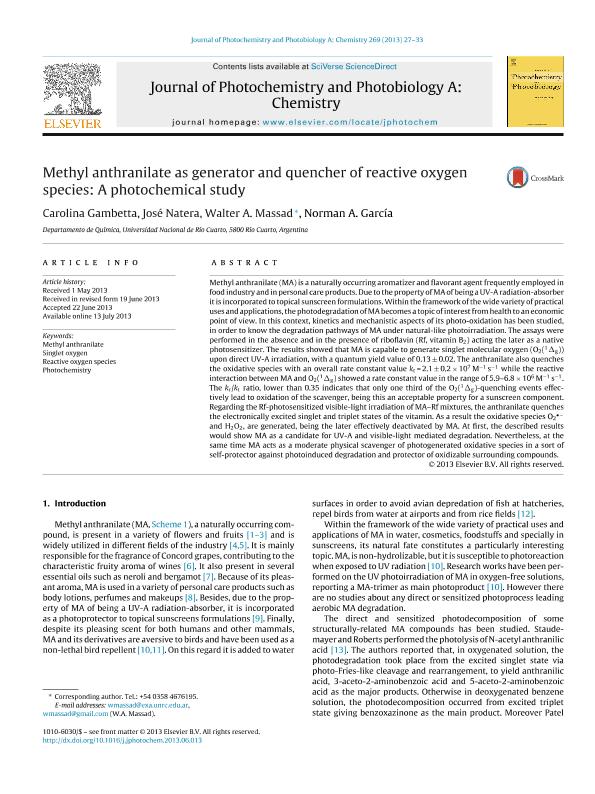Mostrar el registro sencillo del ítem
dc.contributor.author
Gambetta, Carolina

dc.contributor.author
Natera, Jose Eduardo

dc.contributor.author
Massad, Walter Alfredo

dc.contributor.author
Garcia, Norman Andino

dc.date.available
2017-08-30T15:43:32Z
dc.date.issued
2013-07
dc.identifier.citation
Gambetta, Carolina; Natera, Jose Eduardo; Massad, Walter Alfredo; Garcia, Norman Andino; Methyl anthranilate as generator and quencher of reactive oxygen species: a photochemical study; Elsevier Science; Journal of Photochemistry and Photobiology A: Chemistry; 269; 7-2013; 27-33
dc.identifier.issn
1010-6030
dc.identifier.uri
http://hdl.handle.net/11336/23309
dc.description.abstract
Methyl anthranilate (MA) is a naturally occurring aromatizer and flavorant agent frequently employed in food industry and in personal care products. Due to the property of MA of being a UV-A radiation-absorber it is incorporated to topical sunscreen formulations. Within the framework of the wide variety of practical uses and applications, the photodegradation of MA becomes a topic of interest from health to an economic point of view. In this context, kinetics and mechanistic aspects of its photo-oxidation has been studied, in order to know the degradation pathways of MA under natural-like photoirradiation. The assays were performed in the absence and in the presence of riboflavin (Rf, vitamin B2) acting the later as a native photosensitizer. The results showed that MA is capable to generate singlet molecular oxygen (O2(1Δg)) upon direct UV-A irradiation, with a quantum yield value of 0.13 ± 0.02. The anthranilate also quenches the oxidative species with an overall rate constant value kt = 2.1 ± 0.2 × 107 M−1 s−1 while the reactive interaction between MA and O2(1Δg) showed a rate constant value in the range of 5.9–6.8 × 106 M−1 s−1. The kr/kt ratio, lower than 0.35 indicates that only one third of the O2(1Δg)-quenching events effectively lead to oxidation of the scavenger, being this an acceptable property for a sunscreen component. Regarding the Rf-photosensitized visible-light irradiation of MA–Rf mixtures, the anthranilate quenches the electronically excited singlet and triplet states of the vitamin. As a result the oxidative species O2− and H2O2, are generated, being the later effectively deactivated by MA. At first, the described results would show MA as a candidate for UV-A and visible-light mediated degradation. Nevertheless, at the same time MA acts as a moderate physical scavenger of photogenerated oxidative species in a sort of self-protector against photoinduced degradation and protector of oxidizable surrounding compounds.
dc.format
application/pdf
dc.language.iso
eng
dc.publisher
Elsevier Science

dc.rights
info:eu-repo/semantics/openAccess
dc.rights.uri
https://creativecommons.org/licenses/by-nc-nd/2.5/ar/
dc.subject
Methyl Anthranilate
dc.subject
Singlet Oxygen
dc.subject
Reactive Oxygen Species
dc.subject
Photochemistry
dc.subject.classification
Otras Ciencias Químicas

dc.subject.classification
Ciencias Químicas

dc.subject.classification
CIENCIAS NATURALES Y EXACTAS

dc.title
Methyl anthranilate as generator and quencher of reactive oxygen species: a photochemical study
dc.type
info:eu-repo/semantics/article
dc.type
info:ar-repo/semantics/artículo
dc.type
info:eu-repo/semantics/publishedVersion
dc.date.updated
2017-08-30T13:54:34Z
dc.journal.volume
269
dc.journal.pagination
27-33
dc.journal.pais
Países Bajos

dc.journal.ciudad
Amsterdam
dc.description.fil
Fil: Gambetta, Carolina. Universidad Nacional de Río Cuarto. Facultad de Ciencias Exactas Fisicoquímicas y Naturales. Departamento de Química; Argentina. Consejo Nacional de Investigaciones Científicas y Técnicas; Argentina
dc.description.fil
Fil: Natera, Jose Eduardo. Universidad Nacional de Río Cuarto. Facultad de Ciencias Exactas Fisicoquímicas y Naturales. Departamento de Química; Argentina. Consejo Nacional de Investigaciones Científicas y Técnicas; Argentina
dc.description.fil
Fil: Massad, Walter Alfredo. Universidad Nacional de Río Cuarto. Facultad de Ciencias Exactas Fisicoquímicas y Naturales. Departamento de Química; Argentina. Consejo Nacional de Investigaciones Científicas y Técnicas; Argentina
dc.description.fil
Fil: Garcia, Norman Andino. Universidad Nacional de Río Cuarto. Facultad de Ciencias Exactas Fisicoquímicas y Naturales. Departamento de Química; Argentina. Consejo Nacional de Investigaciones Científicas y Técnicas; Argentina
dc.journal.title
Journal of Photochemistry and Photobiology A: Chemistry

dc.relation.alternativeid
info:eu-repo/semantics/altIdentifier/doi/http://dx.doi.org/10.1016/j.jphotochem.2013.06.013
dc.relation.alternativeid
info:eu-repo/semantics/altIdentifier/url/http://www.sciencedirect.com/science/article/pii/S1010603013002803
Archivos asociados
